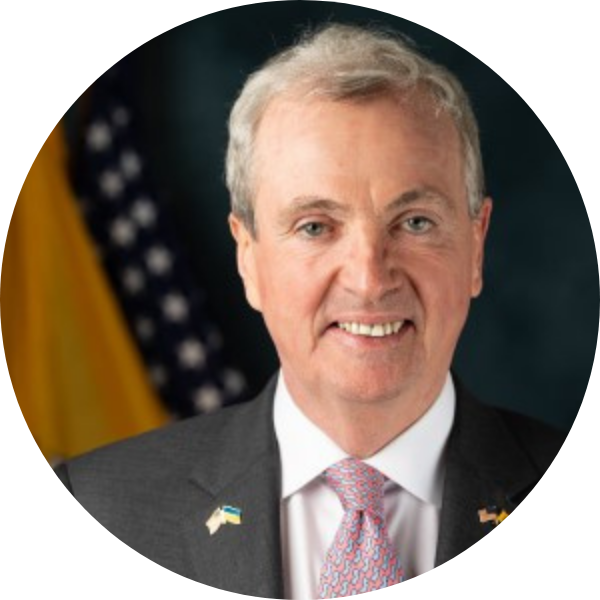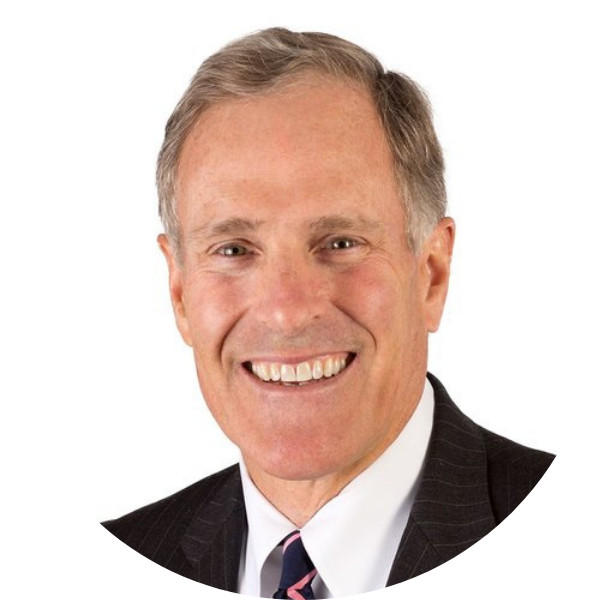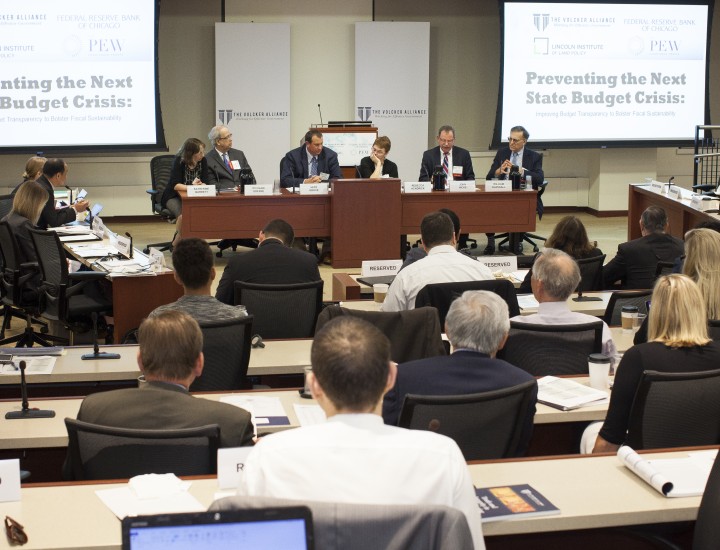Special Briefing: America's Hot Growth States

Western and southern states including Idaho and Florida were among those growing the fastest from the eve of the pandemic in 2019 through 2022. But there were some surprises as well, with Delaware, Maine, and New Jersey also joining the Census Bureau’s hot growth list. While the ability of many Americans to move to low-tax states and work from home played a large role in the population shift, other factors may have been at play as well. Meanwhile, rapid population expansion will pose challenges in many of these states as they cope with enlarging school systems, updating infrastructure, and preparing communities for the impact of extreme weather conditions. Our expert panel will explore these issues and what they may portend for state and local finances.
Our panel of experts will include New Jersey Governor Phil Murphy; Alex Adams, chief budget officer, state of Idaho; Shatakshee Dhongde, professor of economics, Georgia Institute of Technology; Thomas Doe, president, Municipal Market Analytics, Inc.; and Torsten Slok, chief economist, Apollo Global Management.
Moderated by William Glasgall, Volcker Alliance senior director, public finance and Susan Wachter, co-director of the Penn Institute for Urban Research, this briefing is the fiftieth in a series of sixty-minute online conversations featuring experts from the national research networks of the Volcker Alliance and Penn IUR, along with other leading academics, economists, and federal, state, and local leaders.
Special Briefings are made possible by funding from The Century Foundation, the Volcker Alliance, and members of the Penn IUR Advisory Board.
Recordings of the entire Special Briefings series are available on the Volcker Alliance website: SPECIAL BRIEFING SERIES ARCHIVE.
Be sure to subscribe to the Special Briefing podcast, available on Apple Podcasts, Spotify, Google Podcasts, TuneIn, iHeart Radio and more.
Also, be sure to subscribe to the Volcker Alliance newsletter and Penn IUR newsletter.
-----------------------------------------------------------------------------------------------------------------------------------------------------
"INVESTING IN TALENT AND LOCATION": NEW JERSEY GOV. PHIL MURPHY, PUBLIC FINANCE AND ECONOMIC EXPERTS DISCUSS FACTORS BEHIND AMERICA'S HOT GROWTH STATES
Governor Phil Murphy Joined Expert Panelists for a Discussion of the Opportunities and Challenges Faced by America's Fastest Growing States
The discussion centered on the dynamic growth of states, such as New Jersey and Idaho, that have focused on investing in high-growth industries and cultivating local talent. While this growth presents many opportunities, such states also face challenges, including increased demand for public services, strains on infrastructure, and the end of federal pandemic aid. The briefing also touched on the broader economic outlook, with optimism tempered by concerns over long-term interest rates, government debt, and maintaining fiscal discipline to ensure sustainable growth.
“We have reinvested in the industries that brought us to the dance, with pharmaceuticals, bio, life science, tech, and telecom –– to pick sectors that New Jersey has always been strong in –– and we have unleashed new industries,” said New Jersey Governor Phil Murphy. “I use two words: talent and location. Historically, when New Jersey invested aggressively in talent and location, it did well –– and when it didn't –– it did poorly. It's really not a political ideology, It's playing the hand that you were dealt.”
“Where we are at the moment is that… inflation is under control, but interest rates are going to stay higher for a little while longer,” said Torsten Slok, Chief Economist at Apollo Global Management. “But the big picture is: Tax revenue is still good, and we still have a good economy… with the little caveat that the cost of borrowing will remain elevated, probably for another six-to-nine months.”
Idaho has been “the fastest growing state since 2010, and we saw a spike during COVID,” said Alex Adams, Chief Budget Officer, State of Idaho.“ A lot of [why we’re growing] is that we are a low-regulated state. This is the least regulated state in the country, we're also a low taxation state… we’re stable financially, and then there's all those intangible benefits and tangible benefits as we have access to outdoor recreation, beautiful lakes, mountains, access to skiing –– things that were really rejuvenating for many people during COVID.”
“The interesting element of growth is, of course, strains on infrastructure,” said Thomas Doe, President of Municipal Market Analytics, Inc. “So there are going to be some stresses that states are going to have to incorporate in their budgets. We talk a lot about pensions, but here in Texas, there are also going to be increased costs because of the changing climate, whether it's the electricity, water, the airport, or highways. You just are taking abuse from extraordinarily volatile weather conditions that are now commonplace.”
“A recent report by the Federal Reserve Bank of Atlanta showed that the Southeast region, which consists of Alabama, Florida, Georgia, Louisiana, Mississippi and Tennessee, grew around 0.2 percentage points per year faster than the United States in most major metrics of economic performance,” said Shatakshee Dhongde, Associate Professor of Economics at Georgia Institute of Technology. “And one of the key contributors was the rising population growth.”
-----------------------------------------------------------------------------------------------------------------------------------------------------

Philip D. Murphy took the oath of office for a second term as New Jersey’s 56th governor on January 18, 2022. He is the first Democratic governor to serve a second term in 44 years.
Governor Murphy currently serves as Chair of the Democratic Governors Association. The Governor also completed his year-long Chairmanship of the National Governors Association in July of 2023. He is the first governor to have led both organizations simultaneously.
Since taking office in 2018, Governor Murphy has focused on building a stronger, fairer, and more affordable New Jersey. Under his leadership, New Jersey has made strides in growing the state’s economy and creating new economic opportunity while shrinking longstanding inequities, restoring fiscal responsibility to state government while expanding critical investments, and delivering real tax fairness and relief, including 14 tax cuts for New Jersey’s middle class and seniors.
Governor Murphy guided New Jersey from being the epicenter of the COVID-19 pandemic to a model state for following the highest level of public health standards and data-driven response, implementing among the nation’s most robust vaccination efforts and fostering a strong economic recovery. Over the course of two years, the Murphy Administration has provided billions of dollars in state and federal relief to small businesses, schools, homeowners, tenants, and landlords, and middle-class families.
Governor Murphy has put a special emphasis on making New Jersey more welcoming to both established high-tech enterprises and start-up companies in the innovation economy. In January 2021, he enacted a new set of state economic incentives, focused on promoting the growth of new small businesses and innovative startups, enacting the state’s first tax credits for historic preservation, and expanding credits for brownfields reclamation and redevelopment, among other initiatives.
Under the governor’s leadership, New Jersey has emerged as a leader in the deployment of clean energy technologies, including one of the nation’s most-aggressive proposals for the development of offshore wind. He helped break ground at both the Paulsboro Marine Terminal and the South Jersey Wind Port in Salem County, where more than 1,500 new jobs will help secure New Jersey’s place as a global leader in offshore wind component manufacturing and logistics.
The Governor has also focused on making New Jersey a leading location for film, television, and digital production, enacting a new incentive program that drew more than half-a-billion dollars in investment to New Jersey in 2021.
Under Governor Murphy’s leadership, New Jersey had already emerged as a national leader on a number of nationally significant issues prior to the pandemic. He secured the dignity of working families by moving to a $15-per-hour minimum wage, guaranteeing earned sick days, and expanding paid family leave. The governor has enacted initiatives to provide a tuition-free public college education for qualified students. He has embraced policies that have driven down the cost of healthcare. He has expanded protections for the state’s immigrant and LGBTQIA+ communities. And he has enacted and proposed gun safety laws to combat gun violence and promote responsible gun ownership.
Governor Murphy has also made New Jersey a model state for social justice through fostering the state’s nascent adult-use cannabis industry, enacting among the country’s strongest automatic voter registration measures, restoring voting rights to individuals on parole or probation, expunging the records of numerous non-violent offenders, and creating the nation’s strongest provisions for environmental justice, alongside numerous other new laws. He has also put a focus on eliminating stigma and promoting a compassionate approach to tackling opioid misuse.
 Alex Adams is the budget and regulatory director for Governor Brad Little (R-Idaho). He served as chairman of the Governor’s Coronavirus Financial Advisory Committee and is the state’s Infrastructure Coordinator for the Bipartisan Infrastructure Law. Adams is a graduate of the University of Toledo and Johns Hopkins University.
Alex Adams is the budget and regulatory director for Governor Brad Little (R-Idaho). He served as chairman of the Governor’s Coronavirus Financial Advisory Committee and is the state’s Infrastructure Coordinator for the Bipartisan Infrastructure Law. Adams is a graduate of the University of Toledo and Johns Hopkins University.

Dr. Shatakshee Dhongde is a Professor of Economics at Georgia Tech. She obtained her Ph.D. from the University of California, Riverside. Her research has focused on poverty, inequality, and deprivation. She was one of the first scholars to provide consistent estimates of multidimensional poverty in U.S. To date, she has published more than 20 refereed journal articles and book chapters and has presented her research at several national and international forums including the World Bank and the United Nations.
Dr. Dhongde is the recipient of Dean George C. Griffin Faculty of the Year Award (2022), Mary S. and Richard B. Inman, Jr. Faculty Excellence Award (2021), and Ivan Allen Jr. Legacy Award (2019). She is a Fellow of the Society for Economic Measurement and a research affiliate with the Institute of Research on Poverty at the University of Wisconsin, Madison. Her work has featured in media, including the BBC and the NPR. Since 2021, she serves as the Associate Dean of Academic Affairs at the Ivan Allen College of Liberal Arts at Georgia Tech.
 Mr. Tom Doe is President of Municipal Market Analytics, Inc. (MMA) which acquired Municipal Market Advisors in 2014. Mr. Doe founded and served as the CEO of Municipal Market Advisors, the leading independent research firm in the municipal industry, from its inception in 1995.
Mr. Tom Doe is President of Municipal Market Analytics, Inc. (MMA) which acquired Municipal Market Advisors in 2014. Mr. Doe founded and served as the CEO of Municipal Market Advisors, the leading independent research firm in the municipal industry, from its inception in 1995.
Mr. Doe contribution to the municipal industry has been extensive as an analyst, strategist and visionary of the industry’s future. His perspective has been sought after by the leading organizations and institutions and his independence, and that of his firm, has resulted in appearances before Congress and financial regulators to help inform them of the dynamics, issues and challenges in the municipal market and financing public infrastructure. Most memorably, on January 20, 2011, Mr. Doe forcefully represented the industry in a CNBC interview to accurately define market credit risks in response to Meredith Whitney’s alarmist municipal default projection.
Mr. Doe is also lead analyst on MMA’s monthly Municipal Advisor publication which began in 1995, and the firm’s Strategist report. He also contributes to the Insight product.
Between 2002 and 2005, Mr. Doe served a 3-year term as a public member on the Municipal Securities Rulemaking Board (MSRB), the regulatory entity of the municipal securities industry.
Prior to founding MMA, Mr. Doe served as an analyst and manager at Municipal Market Data, Inc. from 1984 to its successful sale to the Thomson Reuters Corporation in 1994.
Mr. Doe received his undergraduate degree from Colgate University and a Master’s from Harvard University.
 Torsten Slok is chief economist at Apollo Global Management’s executive office in New York. Prior to joining the firm in August 2020, he worked for 15 years on the sell-side, where his team was top-ranked by Institutional Investor in fixed income and equities for ten years, including No. 1 in 2019. Previously he worked at the OECD in Paris, in the Money and Finance Division and the Structural Policy Analysis Division. Before joining the OECD he worked for four years at the IMF in the division responsible for writing the World Economic Outlook and the division responsible for China, Hong Kong, and Mongolia.
Torsten Slok is chief economist at Apollo Global Management’s executive office in New York. Prior to joining the firm in August 2020, he worked for 15 years on the sell-side, where his team was top-ranked by Institutional Investor in fixed income and equities for ten years, including No. 1 in 2019. Previously he worked at the OECD in Paris, in the Money and Finance Division and the Structural Policy Analysis Division. Before joining the OECD he worked for four years at the IMF in the division responsible for writing the World Economic Outlook and the division responsible for China, Hong Kong, and Mongolia.
Torsten studied at University of Copenhagen and Princeton University. He frequently appears in the media (CNBC, Bloomberg, WSJ, NYT, FT), and has published numerous journal articles and reviews on economics and policy analysis, including in the Journal of International Economics, Journal of International Money and Finance, and The Econometric Journal.



